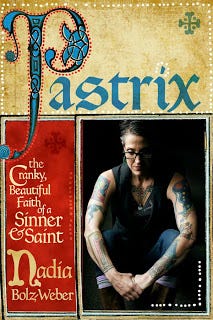Pastrix by Nadia Bolz-Weber

Last week I finished reading Pastrix: The Cranky, Beautiful Faith of a Sinner & Saint by Nadia Bolz-Weber, Lutheran pastor of House for All Sinners and Saints. Many of you will have already read reviews of Pastrix by Rachel Held Evans and Tony Jones.
So this isn't a review exactly, but rather some idiosyncratic thoughts and reactions to Pastrix and Nadia Bolz-Weber.
To start, I've never met Nadia but I do need to thank her for something important. One of the things Nadia is known for is her tattoos. What grabbed my attention a few years ago was how Nadia has the liturgical calender tattooed on her arms. And that was the seed of inspiration for my own tattoo of Rublev's icon that I got last year. So thank you, Nadia, for that.
Also, before commenting about the contents of Pastrix, I probably should say something about language. Nadia isn't your typical Lutheran pastor. There are a lot of f-bombs in the book. So if you are offended by such things be warned. Though, to be honest, I get sort of annoyed in needing to give such warnings. Why are so many Christians such pious fragile little daisies? Do we really think Jesus was so easily offended? Goodness sakes, look who Jesus hung out with.
I really struggle with how uptight so many Christians are. I'm very impatient with all the fretful, neurotic hand-wringing. Anyway, if you are that sort of Christian Pastrix isn't for you.
So what is Pastrix about? It's a spiritual memoir that, roughly, moves through three parts of of Nadia's life. The first part covers Nadia's early years growing up in fundamentalist Christianity, her descent into drugs and sex, to her eventual return to Christianity. The second part is Nadia's calling to the pastorate and the founding of House for All Sinners and Saints. And the final part is stories about the growth of the church and Nadia's pastorate. All the way through are raw, powerful and confessional stories of both success and failure, each salted with the crazy juxtapositions created by Nadia's personal history and personality in light of her life as the spiritual leader of a faith community.
It's a mind-blowing journey to say the least, from growing up in the fundamentalist Churches of Christ to being the female pastor of a Lutheran church that is welcoming of gay and trans* persons. The family at House for All Sinners and Saints is an eclectic bunch, from soccer moms to drag queens, a community bearing witness to the radical hospitality of the Kingdom.
Pastrix also gives you a window into some the liturgical innovations at House for All Sinners and Saints, from the Blessing of the Bicycles to Beer & Hymns.
Before reading Pastrix I hadn't known that Nadia grew up in the Churches of Christ. This is my faith tradition. It both thrilled and saddened me to discover this connection. The thrill is just the simple excitement you have when you find a point of contact with someone you admire. The sadness was due to the fact that the Churches of Christ come off pretty badly in Nadia's story. This is understandable. Historically, the Churches of Christ have been very sectarian, conservative, fundamentalist and judgmental. Consequently, a lot of people have been severely damaged by the tradition. Nadia is one of them, though she does seem to have reconciled with her parents who (it seems) are still affiliated with the Churches of Christ.
I don't want defend the Churches of Christ in this regard. Damage is damage and shouldn't be ignored. But for some reason, I wasn't similarly damaged by the tradition and still find myself a part of the Churches of Christ. To be sure, I'm a bit of an outlier in the Churches of Christ. But our tradition is changing. Yes, there continues to be a very sectarian strain of the Churches of Christ. So you need to clarify when you run into someone who identifies as "Church of Christ." Because there is a growing ecumenical strain within of the Churches of Christ, many of whom would embrace Nadia with open arms.
And having mentioned of the Churches of Christ, and given our penchant for bible-thumping, let me end with what really jumped out to me about Pastrix, something that hasn't been mentioned in any of the reviews I've read.
What I loved about Pastrix is how much the bible features in the story. Almost very chapter starts off with a Scripture quotation. More, many chapters--most of my favorite chapters--revolve around how Nadia struggles to preach a given week's lectionary text. So much of the story in Pastrix is watching Nadia wrestle with the bible. How to preach a particular text on the anniversary of 9/11 or after the tsunami in Haiti? How to preach about loving enemies or about how the Kingdom of God is like yeast?
That's what I most loved about Pastrix, how the bible kept crashing into the messiness of Nadia's life and the life of her crazy and amazing church. Being interrupted by the bible, in hard but often life-giving ways, is something that I can deeply identify with.
I don't know if being raised in the Churches of Christ had anything to do with how much the bible drives the stories in Pastrix. I suspect it has more to do with the Revised Common Lectionary than any latent Church of Christ DNA. And yet, I also found it interesting that House for All Sinners and Saints sings a cappella, the way Churches of Christ worship.
Are these the long shadows of the past in Nadia's story? Probably not. Nadia's story is uniquely her own, a journey that has taken her a long, long way from her childhood experiences with the Churches of Christ. And for many of us, that is exactly what has to happen for us to encounter God's amazing and surprising grace.



